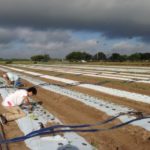Study looks at effect on pepper plants, soil microbes under water-deficient stress
Writer: Paul Schattenberg, 210-859-5752, paschattenberg@ag.tamu.edu
Contacts: Dr. Daniel Leskovar, 830-278-9151, Daniel.Leskovar@ag.tamu.edu
Kuan Qin, 830-278-9151, qinkuan@tamu.edu
UVALDE – A recent study by Texas A&M AgriLife Research scientists at the Texas A&M AgriLife Research and Extension Center in Uvalde shows applying a soil amendment containing humic substances can positively affect vegetable growth and soil properties under different environments.
The study, “Lignite-derived humic substances modulate pepper and soil-biota growth under water deficit stress,” was conducted by AgriLife Research graduate student Kuan Qin in collaboration with center director and plant physiologist Dr. Daniel Leskovar. It is currently under review for publication in the Journal of Plant Nutrition and Soil Science.
AgriLife personel prepare ground for pepper planting and adding humic substances as a soil amendment. (Texas A&M AgriLife Research photo)
Humic substances, which refer to a mixture of soil organic matter resulting from the decomposition of plant and animal residues, contain three fractions – fulvic acid, humic acid and humin – that have been shown through previous research to have a beneficial effect on plant root initiation and elongation.
Leskovar said with population growth and intense farming practices, maximizing crop yield in less fertile soils and mitigating plant growth under abiotic stress conditions are major challenges.
“The study showed soil amendment using lignite-derived humic substances improved the condition of plants exposed to water stress by reducing moisture loss,” he said. “Due to their capacity for improving plant root growth, soil nutrient cycling and microbial activity, the application of humic substances may have long-term benefits in agricultural systems.”
Qin said a primary objective of this study was to determine if this particular type of soil amendment could have a positive impact on plant growth under stress caused by drought or similar water-deficit conditions.
“Organic matter-derived soil amendments containing humic substances are known to have a functional role in improving plant growth and soil quality, but their response to water-deficit stress was unknown, particularly in vegetable crops,” he said.
Humic substances contain special structural features that can bind toxic organic and inorganic compounds that occur in limited water environments, which reduces their bio-availability and toxicity.
“Previous research had also demonstrated that humic substances had a positive effect on soil environmental changes,” Leskovar said. “This suggested to us that the application of humic substances as a soil amendment might be a promising strategy for mitigating water-limited stress, especially in arid or semi-arid regions or in soils having a lower water-holding capacity.”
Leskovar also noted humic substances had been shown to increase soil organic content and the concentration of nitrogen and phosphorous, which provide nutrients to plants, as well as increase the amount of soil microbes, especially in nutrient-limited soils.
“We hypothesized that soil amendment using lignite-derived humic substances would alter plant gas exchange, root growth and soil microbial activity, which in turn might mitigate potential crop losses under water-stress conditions,” he said.
For the study, bell pepper plants were used to help determine the amendment’s effects on plant morphology and physiology. The plants were grown in sandy and clay soil previously mixed with lignite-derived humic substances and subjected to four different irrigation levels – 20, 40, 60 and 80 percent irrigation — based on soil water-holding capacity. Plant growth traits, soil chemical properties and microbial populations were measured and analyzed.
“Our study results showed humic substances increased plant root development and soil bacteria population in the moderate and no-stress conditions of 60 and 80 percent irrigation,” Leskovar said. “Physiologically, the amendment rapidly decreased leaf stomatal conductance and transpiration after imposing severe or mild stress at 20 percent and 40 percent levels.”
The amendment differentially affected plant and soil responses depending on soil moisture levels and soil types, Qin explained.
“Humic substances increased bell pepper tolerance to water stress conditions due to leaf moisture loss reduction and root development stimulation,” he said. “It also caused positive changes in microbial growth and soil environment.”
As a result, the scientists concluded, humic substances demonstrated the potential to mitigate severe or mild water stress in the short term and promote plant growth under moderate mid-term stress.
-30-
Related
Source: AgriLife Research study examines humic substances as soil amendment | AgriLife Today


